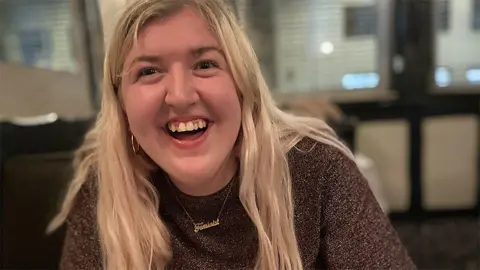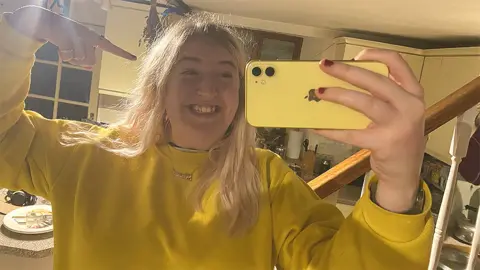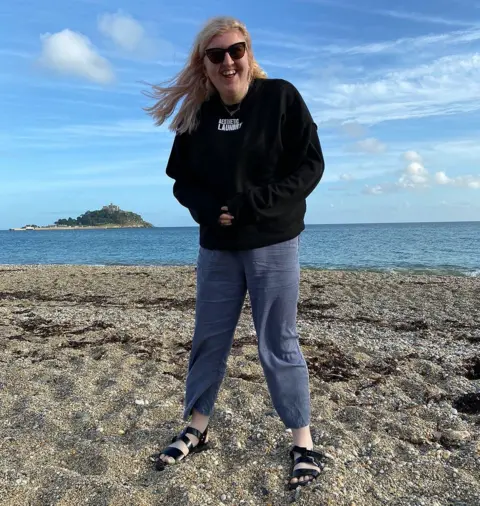Online bullying: 'I've blocked nearly 10,000 abusive accounts'
 Phoebe Jameson
Phoebe Jameson"I'd say at worst I was receiving 100 death threats a day online," Phoebe Jameson tells Radio 1 Newsbeat. "I have nearly 10,000 accounts blocked."
We've all struggled over the past year, going in and out of lockdown, but for 19-year-old Phoebe there's been no escape online.
She was first trolled after posting body positive photos and messages on social media.
And she reckons the pandemic made things worse.
A photo Phoebe posted to mark International Women's Day in March last year sparked a torrent of abuse and attracted "hundreds of comments" about how she looked.
'It's every single day'
"This kept happening across the whole of 2020. It got to the point where from July, I have not had a week's break from any online abuse.
"In these last couple of months, it's been every single day, there will be something or some incident or some comment."
Phoebe has been reporting abusive posts and blocking accounts that were sharing them.
Half of women and non-binary people polled by online abuse charity Glitch and the End Violence Against Women Coalition say they've experienced online abuse since the pandemic began.
And a poll of 2,000 people for the National Children's Bureau, which was published in November 2020, suggests that more people were experiencing and reporting online abuse as bullying in schools decreased - because most people were learning from home.
 Phoebe Jameson
Phoebe JamesonPhoebe says comments and DMs led to her making a suicide attempt in December.
"It got to the point where the comments made me feel like I couldn't be here anymore, really. I ended up in hospital."
When she later posted about her suicide attempt online she received more abuse.
"It was horrific. I just logged off for the rest of Christmas and New Year to just enjoy it and not think about what's being said online," she says.
"I'm not in that place now, but I can't say I'm not going to be in that place again from trolling because, I didn't think that would ever happen to me, I never thought it would reach that point."
'Hyper-disgust' during pandemic
Imran Ahmed is the CEO of the Centre for Countering Digital Hate. He says there has been an "industrial level of trolling" during the coronavirus pandemic, and part of this has included online bullying.
"Right now we are primed to think of things that aren't like us as being dangerous," he tells Newsbeat.
"Think about literally what Covid is - someone you love could kill you, just by coming near you.
"So we're primed to think, I don't want to see people, I don't want to get too close. We are in a hyper-disgust phase."
He says people who troll others online don't get a thrill from the abuse they send, but from seeing the reaction from their victim.
"If you give them what they want and show anger and pain that incentivises them to gain that pleasure again.
"By taking away the possibility of gaining that pleasure, by blocking them, they'll stop."
He also says defending someone against trolls can sometimes do more harm than good because you "rebroadcast, compound and worsen the abuse."
He says blocking and reporting abusive posts and accounts is still our best option, but also to remember that extreme cases may be against the law.
'I shouldn't have to step away'
When Phoebe reported the death threats to her local police, they recommended she log off social media. She did that in the short term for her mental health, but it isn't something she wants to do permanently.
"This is becoming part of my life more especially because we're all virtual now," Phoebe says.
"I don't want to have to censor myself, I think that's the other thing. I tried to be a positive person for others and for my teenage self. I'm trying to be the woman that my teenage self never had.
"It gets tough but I don't feel like I should have to step away because some people don't want me to be existing in that space."
Avon and Somerset police, who Phoebe reported her situation to, says on its website that its officers will deal with online abuse only in the most extreme cases.
These include a threat to someone's life, targeting specific individuals and persistent harassment and ongoing abuse.
 Phoebe Jameson
Phoebe JamesonPhoebe's decided not to pursue matters with the police.
But she does want social media companies to make it harder to set up fake account on their platforms - which is where a lot of the abuse she experienced came from.
She's set up an organisation called The Speak Up Space, where victims of sexual violence and harassment can share their stories and look for help and advice.
And despite the abuse she receives, still feels like the positives of being social media outweigh the negatives.
"It was nice when I had a break, I just stuck to WhatsApp to stay in touch with friends and it felt like a weight lifted. But I also love the community I'm in and I love all these friends I've made and all these people who reach out to me and say these lovely things," she says.
"I don't want to be pushed out or something. And if I choose to leave, that's going to be my decision.
"We're all going through this at the moment, and of course, everyone's reaction is going to be different to the pandemic, but being abusive to people online is not a viable response."


